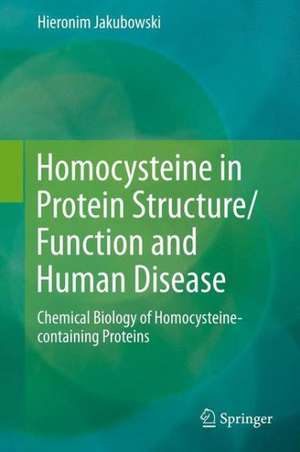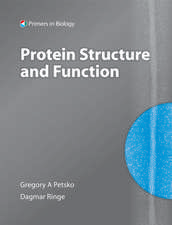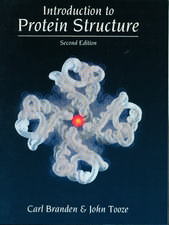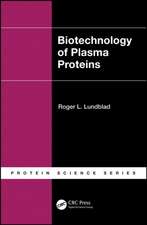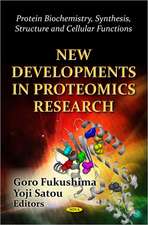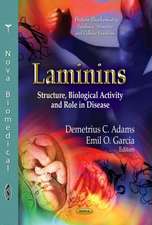Homocysteine in Protein Structure/Function and Human Disease: Chemical Biology of Homocysteine-containing Proteins
Autor Hieronim Jakubowskien Limba Engleză Hardback – 30 iun 2013
| Toate formatele și edițiile | Preț | Express |
|---|---|---|
| Paperback (1) | 933.75 lei 6-8 săpt. | |
| SPRINGER VIENNA – 14 iul 2015 | 933.75 lei 6-8 săpt. | |
| Hardback (1) | 944.99 lei 6-8 săpt. | |
| SPRINGER VIENNA – 30 iun 2013 | 944.99 lei 6-8 săpt. |
Preț: 944.99 lei
Preț vechi: 1152.43 lei
-18% Nou
Puncte Express: 1417
Preț estimativ în valută:
180.86€ • 188.09$ • 151.35£
180.86€ • 188.09$ • 151.35£
Carte tipărită la comandă
Livrare economică 15-29 martie
Preluare comenzi: 021 569.72.76
Specificații
ISBN-13: 9783709114094
ISBN-10: 3709114098
Pagini: 200
Ilustrații: XIII, 166 p.
Dimensiuni: 155 x 235 x 20 mm
Greutate: 0.43 kg
Ediția:2013
Editura: SPRINGER VIENNA
Colecția Springer
Locul publicării:Vienna, Austria
ISBN-10: 3709114098
Pagini: 200
Ilustrații: XIII, 166 p.
Dimensiuni: 155 x 235 x 20 mm
Greutate: 0.43 kg
Ediția:2013
Editura: SPRINGER VIENNA
Colecția Springer
Locul publicării:Vienna, Austria
Public țintă
ResearchCuprins
1. Introduction.- 2. Homocysteine. Chemical Synthesis.- Physicochemical Properties.- Quantification Methods.- Metabolic Pathways.- Clinical significance.- 3. Homocysteine Thiolactone.- Chemical Synthesis.- Physicochemical Properties.- Quantification Methods.- Biological Formation and Turnover.- Clinical Significance.- 4. N-Homocysteinylated Proteins.- Functional Consequences.- Albumin.- Fibrinogen.- Cytochrome c.- Other Proteins.- Quantification Methods.- Total N-homocysteinylation assays.- Site-specific N-homocysteinylation assays.- Formation in vivo.- Turnover to Nε-Homocysteinyl-lysine.- Biological Consequences and Clinical Significance.- 5. S-Homocysteinylated Proteins.- Formation in vitro.- Functional Consequences.- Annexin.- Metallothionein.- Fibrilin, Fibronectin, Tropoelastin.- Detection in vivo.- Biological consequences.- Conclusions.- References.
Textul de pe ultima copertă
Excess of homocysteine, a product of the metabolism of the essential amino acid methionine, is associated with poor health, is linked to heart and brain diseases in general human populations, and accelerates mortality in heart disease patients. Neurological and cardiovascular abnormalities occur in patients with severe genetic hyperhomocysteinemia and lead to premature death due to vascular complications. Although it is considered a non-protein amino acid, studies over the past dozen years have discovered mechanisms by which homocysteine becomes a component of proteins. Homocysteine-containing proteins lose their normal biological function and become auto-immunogenic and pro-thrombotic. In this book, the author, a pioneer and a leading contributor to the field, describes up-to date studies of the biological chemistry of homocysteine-containing proteins, as well as pathological consequences and clinical implications of their formation. This is a comprehensive account of the broad range of basic science and medical implications of homocysteine-containing proteins for health and disease.
Caracteristici
Gives new aspects in protein chemistry - protein structure/function modifications by homocysteine
Presents relationship between homocysteinylated proteins, human disease and life span
Covers description of procedures of detection, quantification and study of proteins by homocysteine
Discusses utility of homocysteine-containing proteins as diagnostic markers?
Includes supplementary material: sn.pub/extras
Presents relationship between homocysteinylated proteins, human disease and life span
Covers description of procedures of detection, quantification and study of proteins by homocysteine
Discusses utility of homocysteine-containing proteins as diagnostic markers?
Includes supplementary material: sn.pub/extras
